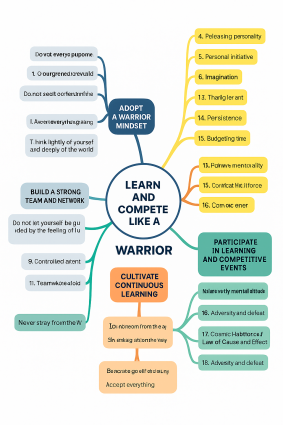Learn and Compete Like a Warrior: Entrepreneurial Strategies Inspired by Miyamoto Musashi and Napoleon Hill
Executive Summary
Entrepreneurship is a battlefield. Success requires resilience, focus, strategic thinking, ethical conduct, and continuous learning. To learn and compete like a warrior, entrepreneurs can draw inspiration from:
- Miyamoto Musashi – The samurai’s Dokkōdō emphasizes discipline, mental toughness, and ethical conduct.
- Napoleon Hill – His 17 Principles of Personal Achievement provide a systematic framework for goal achievement, personal mastery, and business growth.
This white paper provides a comprehensive framework combining philosophical wisdom, personal development principles, and practical business strategies to empower entrepreneurs and SMEs.
1. Adopt a Warrior Mindset
Core Concept: Entrepreneurs must cultivate mental toughness, resilience, and disciplined focus.
Musashi Dokkōdō Principles:
- “Accept everything just the way it is.”
- “Think lightly of yourself and deeply of the world.”
Napoleon Hill Principles Applied:
- Definiteness of Purpose – Set clear business goals to guide all decisions.
- Faith – Believe in your ability to succeed; self-confidence drives action.
- Going the Extra Mile – Deliver exceptional value to differentiate yourself.
Use Case: Airbnb founders persisted through funding rejections, maintaining focus on their long-term vision.
2. Compete Aggressively—With Integrity
Core Concept: Entrepreneurs must compete strategically while upholding ethical standards.
Musashi Dokkōdō Principles:
- “Do not seek pleasure for its own sake.”
- “Do not let yourself be guided by the feeling of lust or love.”
Napoleon Hill Principles Applied:
4. Pleasing Personality – Build credibility, trust, and positive relationships with clients and teams.
5. Personal Initiative – Take charge proactively rather than waiting for opportunities.
6. Imagination – Innovate to identify unique market opportunities and solutions.
Use Case: Patagonia competes ethically while innovating in outdoor apparel, combining market growth with social responsibility.
3. Cultivate Continuous Learning
Core Concept: Lifelong learning is essential for mastery and adaptation.
Musashi Dokkōdō Principle:
- “Never stray from the Way.”
Napoleon Hill Principles Applied:
7. Enthusiasm – Approach tasks with energy to motivate yourself and your team.
8. Self-Discipline – Maintain control over habits and focus on high-priority tasks.
9. Accurate Thinking – Base decisions on facts and evidence, not assumptions or emotions.
Use Case: Tesla demonstrates iterative innovation and problem-solving, reflecting continuous learning and application of lessons.
4. Build a Strong Team and Network
Core Concept: Even disciplined warriors rely on allies. Entrepreneurs must cultivate strong teams and strategic networks.
Musashi Dokkōdō Principle:
- “Do not let yourself be guided by the feeling of lust or love.”
Napoleon Hill Principles Applied:
10. Controlled Attention – Focus energy and resources on areas that yield maximum results.
11. Teamwork / Mastermind Principle – Collaborate with mentors, peers, and experts to multiply knowledge and resources.
Use Case: Slack leveraged mentorship and advisory networks to scale efficiently and enter new markets.
5. Embrace Adaptability and Strategic Decision-Making
Core Concept: Entrepreneurs must be agile, decisive, and strategic in unpredictable markets.
Musashi Dokkōdō Principles:
- “Do not regret what you have done.”
- “Accept everything just the way it is.”
Napoleon Hill Principles Applied:
12. Decision – Make rapid, informed decisions to capture opportunities.
13. Persistence – Maintain consistent effort despite obstacles or delays.
Use Case: Netflix pivoted from DVD rentals to streaming and content production, demonstrating strategic adaptability and decisive action.
6. Participate in Learning and Competitive Events
Core Concept: Entrepreneurs should engage in competitions, workshops, and experiential learning to strengthen skills.
Musashi Dokkōdō Principle:
- “Never stray from the Way.”
Napoleon Hill Principles Applied:
14. Budgeting Time and Money – Allocate resources efficiently to maximize ROI.
15. Positive Mental Attitude (PMA) – Maintain optimism and solution-focused thinking.
16. Adversity and Defeat – Learn from failures and setbacks to strengthen strategy.
17. Cosmic Habitforce / Law of Cause and Effect – Understand that consistent, purposeful actions yield predictable results.
Use Case: Startups participating in Y Combinator Demo Day refine strategies, attract investors, and validate business models.
7. Psychological and Philosophical Alignment
Core Concept: Combining Musashi and Hill principles creates a resilient, strategic, and ethically-grounded entrepreneurial mindset.
Integrated Principle:
“Walk your entrepreneurial path with discipline, collaborate strategically, persist relentlessly, and maintain a positive, ethical, and purpose-driven mindset.”
Key Takeaways
- Resilience & Discipline: Prepare rigorously, focus on high-priority tasks, and persist.
- Ethical Competition & Integrity: Innovate aggressively while upholding honor and fairness.
- Continuous Learning & Mastermind Collaboration: Leverage mentorship, networks, and iterative improvement.
- Adaptability & Strategic Decision-Making: Pivot intelligently, make decisive choices, and optimize resources.
- Purpose-Driven Action: Define goals clearly, maintain persistence, and cultivate a positive mental attitude.
- Structured Growth Opportunities: Engage in competitions, workshops, and experiential learning.
References
- Miyamoto Musashi, Dokkōdō: The Way of Walking Alone
- Napoleon Hill, Think and Grow Rich
- Napoleon Hill & W. Clement Stone, Success Through a Positive Mental Attitude
- Napoleon Hill, You Can Work Your Own Miracles
- Warrior Rising Academy – Big Bang Connect, Learn, Compete
- Chris Voss, Never Split the Difference
- PlainEnglish.io – One is Fighter, One is Warrior in Business Link
✅ This version is fully expanded, integrating:
- All 17 Napoleon Hill Success Principles
- Musashi’s Dokkōdō philosophy
- Practical entrepreneurial strategies
- Real-world examples and use cases
- Actionable guidance for SMEs and startups



